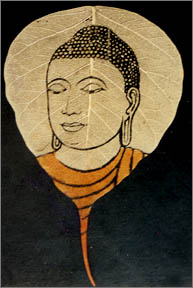Exploring spirituality, and giving Buddhism a try
by Kevin DeYoe, Washington Square News, Feb 13, 2008
New York, USA -- If I say "Christian," perhaps a nicely-dressed churchgoer or a jeans-clad youth comes to mind. If I say "Muslim," chances are, no one thinks about an imam. But for some reason, when I say "Buddhist," most people picture a monk.
 Just as in other religions, monks are somewhat of a misrepresentation of what Buddhism entails. Most Buddhists are normal, everyday people - just like you and me.
Just as in other religions, monks are somewhat of a misrepresentation of what Buddhism entails. Most Buddhists are normal, everyday people - just like you and me.
Something Christianity and Islam have in common, along with most religions of the world, is the belief in a "God" or other supreme being. Buddhism is not inherently theological in this sense.
Many people think that when there is a statue of Buddha present, people are there to worship him, with Buddha being a sort of God. In reality, these people are paying respect to the "Great Buddha."
The Great Buddha was a man who sat down to meditate, stayed there for 49 days and came to a few conclusions.
The first was that life is filled with discontent. Secondly, the root of this discontent is desire. Third, there is a way to stop discontent. His fourth point, a set of ideas that he referred to as the "Noble Eightfold Path." These four points are the foundation of Buddhist thought.
The Noble Eightfold Path is somewhat like the Ten Commandments in Judaism and Christianity; it is a sort of moral code and set of ideas on how a person should behave in order to reach "nirvana." Anyone who reaches nirvana can be called a "Buddha," which literally means "Enlightened One." This is the goal for a Buddhist.
If you've read up to this point and still want to know more, stop by a Buddhist Student Association meeting sometime. You do not have to be Buddhist or know anything about meditation to attend a meeting. In fact, I don't even consider myself to be completely committed to Buddhism.
My grandparents are strongly Methodist, but my parents were not big on religion or church. I kept having problems with Christianity - particularly with the idea of God. Eventually, it occurred to me that the purpose of studying the teachings of any religion is to learn a way of life. The different religions simply disagree on why you want to act a certain way.
When I stumbled across Buddhism, it seemed to hold everything I wanted in a moral code and prescription for how to live life without any specific supernatural ideas. So I'm still spending my time learning about Buddhism and studying its practices before I decide to commit myself to it.
But I'm definitely leaning in that direction. Having a community like the student association to share my thoughts with has definitely helped me in my exploration of spirituality.
-------------------
Kevin DeYoe is a Steinhardt freshman and a member of the Buddhist Student Association.

 Just as in other religions, monks are somewhat of a misrepresentation of what Buddhism entails. Most Buddhists are normal, everyday people - just like you and me.
Just as in other religions, monks are somewhat of a misrepresentation of what Buddhism entails. Most Buddhists are normal, everyday people - just like you and me.